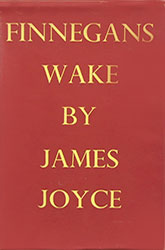Finnegans Wake
Critique • Quotes
 First edition
First editionFirst publication
1988
Literature form
Novel
Genres
Literary
Writing language
English
Author's country
Ireland
Length
Approx. 307,000 words
Again with the jokes
"Science split the atom and Joyce split the word."
This summary of progress in the first half of the twentieth century has often been stated in reference to Finnegans Wake. James Joyce chops up words and fuses syllables together in new ways that supposedly uncover the links made by the subconscious mind.
Even the title is a complicated pun: Finn as in the French fin meaning "end" and egan sounding like "again", thus forming the oxymoron "end again". Wake refers to a party for the recently dead but also a joke because the dream content of Finnegans Wake takes place during Finnegan's sleep. If you find this a knee-slapper, you'll roll on the floor laughing over the rest of Finnegans Wake.
It starts famously in mid-sentence:
riverrun, past Eve and Adams, from swerve of shore to bend of bay, brings us by a commodius vicus of recirculation back to Howth, Castle and Environs.
Sir Tristram, violer d'amores, fr'over the short sea, had passencore rearrived from North Armorica on this side the scraggy isthmus of Europe Minor to wielderfight his penisolate war; nor had topsawyer's rocks by the stream Oconee exaggerated themselse to Laurens County's giorgios while they went doublin their mumper all the time....
It ends (or doesn't end) equally famously—with the first part of that sentence that begins the book, thus leading us in a big circle.
And in-between it gets really strange. It would take a multilinguist a lifetime of study to figure out any one page of this work.
Any non-academic who has tried to read Finnegans Wake may be surprised to hear it actually has a plot of sorts—with characters of sorts, namely the Earwicker family who are trying to counteract an ugly rumour going around Dublin about the male head of the family, Humphrey Chimpden Earwicker usually identified as HCE or "Here Comes Everybody".
Like Joyce's previous prose monster, Ulysses, much of the novel consists of imaginative vignettes stitched together, though the result is even more difficult to follow as it is apparently presented in a night of dreaming. I'm not sure whether it's supposed to be one character dreaming, all the characters dreaming, all Dublin dreaming or all humankind dreaming. Or some kind of shifting perspective involving all the above.
The accessible bit
Also as in Ulysses, the protagonist's wife, in this case Anna Livia Plurabelle or ALP or Alma Luvia Pollabella, has the final monologue. As dawn breaks over the city, she tries to wake her husband:
Rise up, man of the hooths, you have slept so long! Or is it only so mesleems? On your pondered palm. Reclined from cape to pede. With pipe on bowl. Terce for a fiddler, sixt for makmerriers, none for a Cole. Rise up now and aruse! Norvena's over. I am leafy, your goolden, so you called me, may me life, yea your goolden, silve me solve, exsogerraider! You did so drool. I was so sharm.
And so on. This may actually be the most accessible part of the story, though still delivered in Joyce's fractured dream language—whether because ALP is still semi-asleep, or because she's being interpreted by her still dreaming husband or because that's how the subconscious mind supposedly works even when one is awake. She identifies herself as a leaf in the monologue, carried down a stream variably into an ocean or into wakefulness or into her lovers' arms, or maybe she is the stream itself, carrying leaves toward something.
Whatever, there's some strong poetry of a positive life-force here, again much like Molly's seduction at the end of Ulysses, echoing even some of the same language. Yes.
But why then do her morning wake-up thoughts lead back to the beginning which is presumably the next evening? Poetic license to make a point about the flow of consciousness or subconsciousness?
Questions like this make one question the entire project. Finnegans Wake is not really the replication of a night's dream—nothing like my dreams anyway—or even of a whole civilization's dreams mashed together. If it's an attempt to reproduce dream experience in literary style, it reveals the failure of stream-of-consciousness writing taken to an extreme. The reductio ad absurdum.
The hewing man's conditioner
Despite what some philosophers will tell you, life is not primarily a linguistic experience. Neither our day-to-day life nor our mental lives are describable in purely textual terms. Language is tremendously important to human beings, perhaps even central to our success as a species, but it is only a part of our experience of life. And probably even a smaller part of our dream-lives.
I was weirdly excited about this book when I discovered it as a teenager. I thought it was a great joke on all the pretentious literary folk, in the same way John Lennon's scribblings were in the 1960s. (Actually, Finnegans Wake is a lot like the rock musician's literary output, except his was shorter and funnier).
But then I realized no one got the joke. Maybe not even Joyce. Everyone took it so seriously, as if it were a great piece of literature that had something important to say about the modern human condition. Not that they could say what it was, mind you.
— Eric
Critique • Quotes

